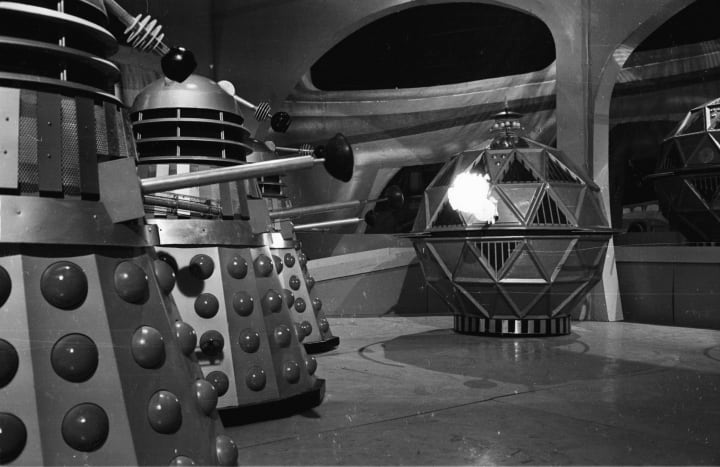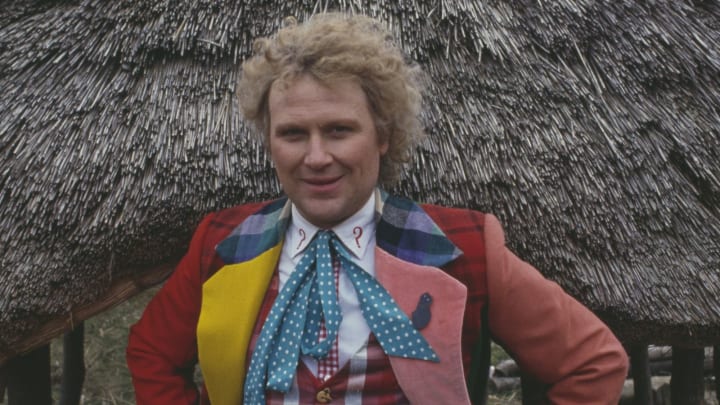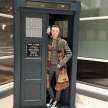Doctor Who: The Juggernauts Review
The Sixth Doctor and Mel go up against three very dangerous foes - the Daleks, Davros and the Mechanoids...

Big Finish have, perhaps more so than the TV series, the ability to bring together loads of different elements from the history of Doctor Who. Marketed specifically for fans, who know the lore and history of the show inside out, bringing back an obscure robot race from the mid 1960s is no issue, nor is plugging a point of continuity from two linked stories from the 1980s. So, a story like "The Juggernauts" is designed purely for the fans, and it works because it doesn't need to keep new fans and casual viewers in the loop. This is a story that plays on the relationship between the Doctor and Davros, and picks up on threads present in previous Big Finish audios to feature the character, most notably the seminal "Davros", as well as developing the character of Mel beyond the one-dimensional caricature she was often forced to play in the TV series. And it does all these jobs superbly.

The basic plot sees the Doctor and Mel separated during an attack upon a spaceship. Mel finds herself on the colony world of Lethe, working with Davros to birth a new generation of Mechanoids, while the Doctor is a prisoner of the Daleks. But just what is Davros up to on Lethe, and what does it have to do with the sealed and damaged section of the colony? This story really does have its work cut out for it, as it has to bring numerous story threads together in order to make a coherent narrative. As sequels to "Revelation of the Daleks" go, this is exactly what you would expect - which is perhaps this story's greatest curse. In terms of original content, there isn't an awful lot here, so I don't think this story will offer any massive surprises for fans (apart from maybe this story's use of Mel). However, it does do all the things it needs to do exceptionally well, and means that the lack of originality in some areas of the story isn't as distracting as it could have been. This is a thoroughly gruesome tale - one with a fair amount of body horror. However, I don't think it is, unlike some of the Sixth Doctor stories we saw on TV, in any way gratuitous. Rather, it uses the horror of the situation to show just how warped and twisted Davros really is, even when, in his head, he is trying to do good. It picks up on the idea from "Davros" that, if given the chance, will Davros change? This story does provide a fairly obvious answer - but it does allow for the wider possibility that Davros may actually want to do good, he just has no concept of what that is. Davros is very much front and centre here, and his machinations fuel the character drama around it, whether it be Geoff and Mel's relationship, the character arc of the treacherous Brauer, or the strain the Doctor's betrayal puts on his and Mel's friendship. And while Davros is plotting, so are the Daleks. This story pitches them more in the vein of David Whitaker's vision of the Daleks: cold, calculating killers, rather than the mindless war machines other writers have portrayed them as. It works really well here, because for the first half of the story, the Daleks very much take a backseat to Davros and the Mechanoids. However, when they emerge all guns blazing in the final episode, it just highlights their brutal nature even more. From a writing perspective, writer Scott Alan Woodard couldn't have done a better job, quite frankly.

A good script, however, is only half the picture. Fortunately, however, I can say that the production on this release is top quality, with some fantastic performances and superb production work. The characters all have plenty to do, and the slightly extended runtime gives the release the chance to breath and to develop. The guest characters are beautifully written, and the actors have plenty of opportunities to demonstrate their skill. I particularly loved the very natural relationship between Sonali and Geoff: it is quite refreshing to hear a relationship like this in a Sixth Doctor adventure, and it shows a level of maturity the show at the time simply didn't have. It helps that the actors play it in a very natural way, and the chemistry between Bindya Solanki and Klaus White feels perfectly natural and organic. The presentation of Brauer is similarly contemporary, and touches on themes the TV show of 1986 couldn't hope to. Out of our cast, however, it is Colin Baker, Bonnie Langford and Terry Molloy who shine the brightest: Langford, in particular, gets material that really shows off her talents as an actress. She has the chance to play a fully-rounded, three-dimensional version of Mel, and Bonnie rises to the occasion with aplomb. Molloy remains the personification of evil, and he reprises Davros like no time has passed since the late 1980s. His dynamic with Colin remains as strong as ever: of the three Doctors Molloy has starred alongside, his interactions with Colin are by far the strongest, and this story continues that strong run. As for Colin, his Doctor gets pushed in some directions we've never really seen from him before, and puts a strain on his relationship with Mel like we haven't seen before or since. All this is superbly handled by Gary Russell, who directs this play, and brings out some fantastic performances, while Steve Foxon, who handles all the post-production work, brings an extra dimension to this release. His work with the Mechanoids, particularly, brings this classic monster to life like it was still 1965. It makes for a very impressive piece of work all round.

Overall, then, "The Juggernauts" is a really enjoyable slice of Doctor Who action. As well as being a great, gripping story in its own right, it is an excellent examination of the Doctor, of Mel, and of Davros, and pushes all three into new and unexplored territory. Together with some fantastic performances, a horribly dark tone and fan service that never feels too gratuitous, this makes a near perfect cocktail, and a reminder that you can never trust the deranged menace of Davros. Simply fantastic, there's no other words needed for this.
You can purchase "The Juggernauts" as a digital download from the Big Finish website (see below). Just type 'Juggernauts' into the search bar at the top of the page.
All pictures copyright to Big Finish Productions/the BBC. Thank you very much for reading.
About the Creator
Joseph A. Morrison
26. Fan of Doctor Who, Blake's 7, The Prisoner and more old-fashioned TV. Reviewer, wannabe writer and general twit.






Comments
There are no comments for this story
Be the first to respond and start the conversation.